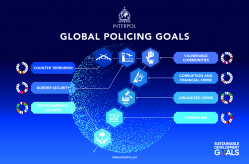Counter-terrorism
INTERPOL maintains a strong working relationship with the United Nation’s dedicated counter-terrorism entities and offices, including its Office of Counter-Terrorism (UNOCT) and its Counter-Terrorism Centre, as well as the Security Council Counter-Terrorism Committee (CTC) and its Executive Directorate (CTED).
Key thematic areas include the threat posed by foreign terrorist fighters, the use of biometrics for effective identification of combatants, terrorist exploitation of new and emerging technologies, and the increasing nexus between terrorism and organized crime.
In December 2018, INTERPOL became one of four non-UN members of the Global Counter-Terrorism Coordination Compact, whose membership today consists of 46 entities. This Compact is key to global counter-terrorism efforts in terms of strengthening coordination and preventing the duplication of efforts. Within this framework, INTERPOL serves as Chair of its Working Group on Emerging Threats and Critical Infrastructure Protection as well as Vice-Chair of its Working Group on Border Management and Law Enforcement.
Additionally, as a key implementing partner of Security Council counter-terrorism resolutions, INTERPOL supports the work of the Security Council Counter-Terrorism Committee (CTC) along with its Executive Directorate (CTED), including through dedicated briefings and participation in country assessment visits.
Transnational organized crime
INTERPOL collaborates closely with the United Nations to combat transnational crime, including through frameworks like the United Nations Convention against Transnational Organized Crime (UNTOC), ensuring global coordination against organized crime and corruption.
INTERPOL facilitates the enforcement of UNTOC provisions by supporting Member States with essential tools and resources, and helping them meet their treaty obligations in areas such as international cooperation, information sharing, and technical assistance.
Corruption and fraud
INTERPOL supports its member countries in implementing the United Nations Convention against Corruption (UNCAC) by facilitating law enforcement cooperation, including by providing operational assistance, capacity-building initiatives, and tools to combat corruption and related crimes.
The UNCAC is the first global legally binding instrument in the fight against corruption. Through its global databases, secure communication I-24/7 channel, color-coded notices, and specialized expertise, INTERPOL facilitates the exchange of information and international cooperation among law enforcement agencies to combat corruption, helping countries implement their treaty obligations.
Drug Trafficking
Combatting drug trafficking worldwide remains one of the priority engagement areas for INTERPOL in its cooperation with the United Nations. The role of INTERPOL in assisting member countries in fulfilling the obligations from the Drug Treaties has been acknowledged at an early stage. As the 1961 and 1988 Conventions were adopted, the United Nations’ Conferences already called on States Parties to make best use of INTERPOL’s tools and channels in relation to technical assistance and information sharing, to achieve the goals of these Conventions.
Since then, INTERPOL has been supporting law enforcement worldwide to provide a collective response to the world drug problem. INTERPOL works closely with the UN Commission on Narcotic Drugs (CND), the central policymaking body within the United Nations system for drug control matters. In doing so, INTERPOL provides its on-the ground, operational knowledge and expertise to the CND, highlighting the critical role of global law enforcement in steering and supporting supply-reduction strategies to address drug trafficking, organized crime, and related threats through international cooperation, information sharing, and capacity-building initiatives.
Crime Prevention and Criminal Justice
INTERPOL closely works with its UN counterparts on all matters related to crime prevention and criminal justice. INTERPOL regularly contributes with its expertise to the work of the United Nations Commission on Crime Prevention and Criminal Justice (CCPCJ).
The CCPCJ is the primary UN body in charge of promoting the rule of law, human rights, and sustainable development by addressing the root causes of crime, strengthening criminal justice institutions, and fostering international cooperation to combat national and transnational crime.
Through numerous resolutions, the UN Crime Commission has acknowledged the value for member states to use INTERPOL’s expertise and tools including to prevent child recruitment and exploitation by organized criminal and terrorist groups, and to prevent and combat illicit trafficking in all its forms.
Cybercrime
INTERPOL, in its capacity as a Permanent Observer to the UN, took an active part in the work of the UN Ad Hoc Committee to Elaborate a Comprehensive International Convention on Countering the Use of Information and Communications Technologies for Criminal Purposes. This landmark treaty establishes a comprehensive, legally-binding framework for tackling the complex and evolving challenges of cybercrime, including illegal access and interception, child sexual abuse, and the laundering of proceeds of crime. The Treaty underscores the importance of international cooperation in protecting communities, businesses, and governments worldwide.
Notably, the Convention emphasizes INTERPOL’s essential role in facilitating international law enforcement cooperation. It also highlights INTERPOL’s 24/7 point of contact network and the opportunity of using INTERPOL’s secure channels for transmitting mutual legal assistance and extradition requests in a timely manner.
INTERPOL actively participates in the Open-ended Working Group on security of and in the use of information and communications technologies 2021-2025, mandated to develop the rules, norms and principles of responsible behaviour of States, review state efforts to secure information and communications technologies, and host regular UN dialogues with widespread state involvement.
The INTERPOL Global Policing Goals and the UN 2030 Agenda for Sustainable Development
Security and development are inextricably linked. International police cooperation in vital to fostering human security, safeguarding resources, and creating environments conducive to economic growth and social well-being.
The global development community recognizes this nexus, as reflected in Agenda 2030 and particularly its Sustainable Development Goal (SDG) 16 on “peace, justice and strong institutions.”
It also inspired INTERPOL’s 7 Global Policing Goals (GPGs), aligning law enforcement efforts with the SDGs to ensure that global security drives global sustainability. The GPGs, developed in 2018 and reviewed in 2023, shape how the global law enforcement community works together to create a safer and more prosperous world.




